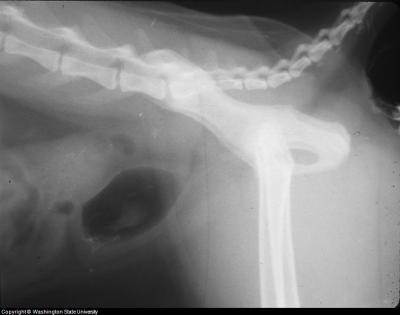Feline Cystitis
"Feline cystitis is also known by several other names, such as Feline Lower Urinary Tract Disease, shortened to the acronym FLUTD , Feline Urological Syndrome (FUS) or Feline Idiopathic Cystitis (FIC). It is a disease causing inflammation of the bladder. It is easy to treat if the symptoms are caught early."
Cause of Feline Cystitis:
While it’s frustrating for the owner to be told there is no easily identifiable cause for cystitis in cats; that is actually the case. There is no “one” identifiable cause for it and research is still underway to pin this down in the areas of viruses and stress induced illnesses. Feline idiopathic cystitis is often used to describe a urinary condition where all other possible causes have been eliminated and one that has no known cause.
There are some common denominators for owners to be aware of for their cats when it comes to cystitis in cats. It appears that cats that are altered too early may contract cystitis more often. There also seems to be a correlation between too much dry cat food and the aggravation of the the disease once it has occurred. This isn’t to say the dry cat food causes the problem, but it does irritate it, as many dry cat foods have a high ash content.
Some vets feel not cleaning the litter box frequently may cause bacteria buildup for your cat(s). Just to be clear though, none of these things “start” cystitis. They do however make things worse.
Feline idiopathic cystitis occurs in male and female cats.
Signs and Symptoms of Feline Cystitis:
Some things you will notice if your cat has cystitis are:
- Making frequent trips to the litter box
- Straining to pass urine, but very little or none is passed
- Cat urine passed smells awful and may be cloudy with pus in it
- Changes in their normal personality and they become cranky
- Urinating in other places in the house and bypassing the litter box
- Excessive genital licking
- Crying when urinating; an indicator they are in pain
- Preferring to lay on cold surfaces to ease the pain
Diagnosis of Feline Cystitis:
One of the first things a veterinarian will do is a complete physical
examination, followed by a urinalysis. The urine test will reveal
whether or not your cat has an infection or another problem. If an
infection is present, culturing the urine sample will pin-point which
antibiotic to use.

Feline Cystitis X-Ray
If the cat cystitis symptoms reoccur or become chronic, the vet will take x-rays to examine the bladder, may perform an ultrasound and do a complete blood panel. It’s important to note that cystitis and urinary stones produce similar symptoms. However, urinary stones, also called uroliths are crystallized minerals - oxalate, cystine, urate or struvite – and may be located anywhere in the cat’s urinary tract. In the bladder, they cause irritation and the likelihood of infections. In the urethra, they cause a life-threatening blockage. If not treated promptly, your cat will die.
If you notice any of the symptoms discussed here, take your cat to the vet immediately.
Treatment of Feline Cystitis:
If your cat has a bladder infection, antibiotics will be prescribed. If your cat has cystitis, there is no one definitive treatment. Often, vets will refer to it as “feline idiopathic cystitis,” which means they don’t know the cause.
To help manage your cat’s symptoms, the vet will likely recommend changing the diet, something you may be able to manage at home, if you are able to, or they will switch your cat to a special prescription diet, featuring food with low ash content.
Your cat’s water intake must be increased and the vet will also work to alter the urine pH level. This is why dry food with a low ash content is important.
If your cat is in pain, the vet may prescribe painkillers. Generally speaking, most bouts of cystitis are over in about a week. Unfortunately though, once your cat has had this disease, they may have it again. (HINT: if you want to increase your cat’s fluid intake, mix a touch of wet food into the water. Don’t soak dry food, as the dry tends to make bladder inflammation worse.)
You may also be told to reduce your cat’s stress levels, something that baffles many owners. How does one reduce the stress level of a cat? There may be some obvious things to do, such as making sure the dog doesn’t chase your cat, or reduce other sources of stress such as introducing a new pet into the home or changing a cats diet. In addition, if your cat is a live-wire to begin with, changing their personality is virtually impossible. Just do the best you can, follow diet recommendations, make sure they drink plenty of water and monitor them closely for recurring symptoms.
You may also want to try natural supportive remedies in combination with the specific cat cystitis treatment recommended by your vet, but make sure your vet is aware you are doing it. One remedy that can help to improve urinary health and to prevent future feline urinary tract infections is UTI Free. A natural remedy formulated to help cats reduce stress and nervousness such as Pet Calm may also help,
References:
X-Ray from the Washington State University College of Veterinary Medicine
Help Others with a Cat Urinary Problem
Do you have a cat urinary system related question for our editors or a helpful story to share?
Please include your cat's medical history such as age, sex, breed, medical history, symptoms, diagnosis, diet, changes in behavior, diet and medications.
We will do our best to get back to you quickly (it depends on how many questions we receive each day). If you need an immediate response we suggest using this online cat veterinary answer service that is available 24 hours a day. You only pay for answers that you see and then accept.